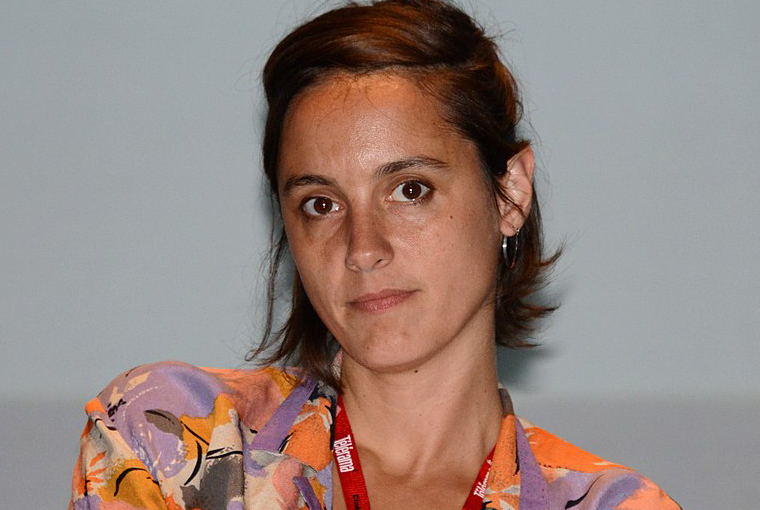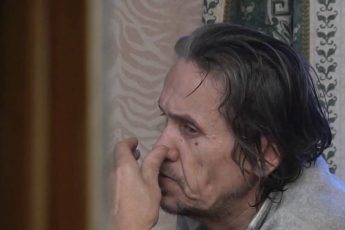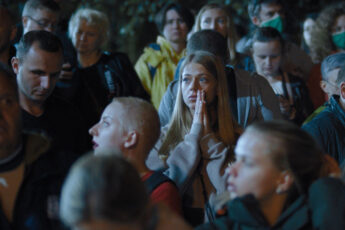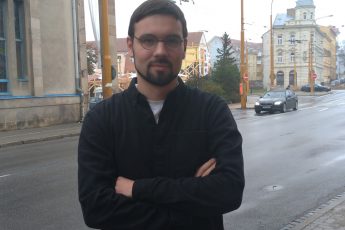
We met Elitza Gueorguieva during this year’s DOK Leipzig film festival (October 25-31) to speak to her about her latest film “Our Quiet Place”. The film follows a Belarusian writer as she processes the loss of her father through her work. Gueorguieva speaks about the origin of the project, her aesthetic approach, and its reception.
Our Quiet Place deals with language and writing, so why did you specifically choose film as the medium for it?
In France, I was in the same writing group as Aliona [Gloukhova, writer and the film’s documentary subject], and we are writing directly in French. We are not at the same level with the language because she arrived much later than me, but we were both questioning it all the time, reading work by the other French participants and talking about what it means to write in another language. We also both wrote about our childhoods. So I was thinking about it constantly, and we wanted to make a performance because at that time we were doing a lot of readings and performances based on literature. I was already directing, I mean I was making my first film at the time but I already had much more knowledge and experience of cinema. So when I wrote the text, I wanted to make a film out of it.
Aliona’s language is very poetic and also very cinematographic. I had a lot of images and ideas of how to film it, and it represented an opportunity to go beyond the text and really explore that country [Belarus] and that context, which really reminds me of my native Bulgaria, but with some differences, of course. And that also gave me the possibility to go there. So we went to Belarus, but it was really before I had written a script about how to do the film. We just went there without any funding. Aliona found a camera, which I had never used before, and we started to shoot, and it was so interesting. I really wanted to compose the film out of reality, so to me it was clearly a documentary and not an adaptation of Aliona’s novel. I didn’t want to do that – I wanted to use everything that happened at that moment, during writing. It also gave me an opportunity to enter the political context a bit more, because in Aliona’s novel it’s more subtle. It’s there, but of course the principal story is about her and her father. So that’s how we started.
The film weaves together a lot of different elements, but it sounds like you had quite a freeform intuitive approach. How much of it was planned at the beginning and how much of it did you work out through the act of filming?
There were two movements. The first one was spontaneous, and in the end we used a lot of that first movement in the editing, in the final film. Even though it wasn’t a professional shoot but just the first trials, it was still stronger because it was the first time and something happened that you can’t really explain, it was about intuition. And also, we had time. We had much more time to shoot, like in a documentary, where you can usually take your time. So a lot of things happened, like the scene with the tortoise in the bar. Things that reminded us of Aliona’s story kept happening in life while we were shooting. So that was the first spontaneous, magic movement.
But then there was another one, which was the writing process. The editing process of this film was so long, it wasn’t spontaneous at all – exactly on the contrary. We were working for a very, very long time – maybe a few months every year. So we were editing for two years, but of course with breaks. I wanted to try a different approach. It was a film that I experimented with a lot, and Aliona was also trying to invent ways to shoot. And in the end I also wanted to compose a piece out of all those different types of cinema – documentary, performance, etc. – and in the end the film is more like fiction, and I think that’s also what she’s doing in her writing process. She had a very documentary part, but in the end, she also invented a lot of hypotheses that are not based on reality.
That also connects back to the central topic of using a foreign language to create space for imagination and distance…
Yes, because when you’re writing in another language you will touch on something more unconscious, or at least that’s how it was in Aliona’s case. Because we are always approximative. She’s not as precise as in her own language, which is Russian, in which she has a lot of words at her disposal. So in French you have this “flottement” [unsteadiness], and you can get lost. And that’s exactly what she was doing. It’s also what we did with the film, which is a long journey on the sea, without a precise logical route that leads from point A to point B. The idea was to just get lost.
And how was the collaboration between you two? Was Aliona very involved in the creative process, or were you mainly directing her?
She was always present, and I always talked to her about how we were going to do things. But I was clearly directing her, she was like an actress. Of course, when I made some choices in the text, I always asked her about them. She came to see the editing process a lot of times and we stopped the editing to shoot more and then went back to editing again. So she was always participating, but it was clear that I’m filming her and that our relationship was mediated through the camera. There were also a lot of coincidences between the two of us because we were reading the same things. And we’re both from Eastern Europe, so here in France people always confuse our names, even though we are very different. So there is that kind of mystery about our two personalities, which often get confused. In our dialogue through the camera there are things that we really said, but there are also a lot of things that I put in her mouth. And when I would ask her how she would respond to this or that question, she said exactly the same thing I had already written down. So there was a pact that I could also invent things, but we were in the same place mentally to such an extent that it wasn’t really a problem.
What will you focus on in your future work? Film, or writing, or both?
I’m trying to do everything at the same time, and of course in cinema you have more deadlines, so even though I’m trying to write my novel I end up writing films. I’m in the process of writing at the moment but I’m not shooting now, I’m just writing a book.
And is there also a relationship between your writing and your filming in your other work?
Yeah, I really like to bring literature to cinema. For example, in my first film Every Wall is a Door, which is really a film about the end of Communism in Bulgaria, but with my personal story intertwined, there is a text that appears between the archives – because it’s an archival film. So, that was a way for me to bring writing in. I also really like documentary with voice-over, where there’s a more personal narrative that comes from writing. Of course, it’s not always the case that it’s visualized in the film, but it’s important for me. I often shoot something with my camera and then I write. Sometimes it’s just research material, and very often I try to describe the image, the picture, so it becomes pictorial. Sometimes in my text you can feel that process.
I’m assuming most of your screenings have been online, which makes it harder to get feedback from the audience, but have you managed to hear about any reactions?
Yeah, the premiere was in Nyon and I went there but no one else did. It was a very professional festival, so there wasn’t an audience, and also my producer got Covid exactly that week. So I was alone and it was very sad in that sense, but at the same time I was very happy to be there and the people who selected the film were really lovely. It was also in Lussas, which is a big festival in France, and some other smaller ones. It’s not easy this year, it’s not the best year to have a film, but I still have some selections to come I hope.
As for audience reactions, it was very interesting in Lussas. I showed it at a small literature festival that took place at the time when Aliona was at the writing residency you see in the film. I showed it to an audience of only writers, and I was like, “ugh, what are they going to think about it?”, because they were in the same room, but they really loved it. They were very sensitive about the links between literature and cinema, and they really liked the writing on the picture, the graphic text, so that was cool. But I think it’s a very precise topic and you can be touched, and in that sense, I got some very important and beautiful reactions, but you can also find it complicated. So I think it’s not an easy film. For example, my first film was also selected for film festivals, but it was more effective. With that one you could sit in it and like it without understanding it, so we’ll see how it goes with this one.
Thank you for the interview.




Leave a Comment